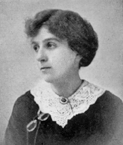Marjorie L.C. Pickthall
1883-1922

Stars
In the Gardens of Shushan
The Lamp of Poor Souls
Song
Thoughts
The House
A Child's Song of Christmas
The Tree
Armorel
Finis
To Timarion
The Green Month
Serenade
Dream River
Will You Fare On,
My Songs
The Wife
Quiet
Malachi's Song
for seasons (song cycle)
Daisy Time
Before a Shower
November
Dawn-Song
Marjorie Lowry Christie Pickthall was somewhat of a star, garnering much attention as a teenager for her early writings in the Toronto Globe and in the Young People’s Corner of the Mail and Empire. Her stunning rise in public popularity, however, was offset by her subsequent freefall into literary obscurity, as the showering of awards and accolades for her rapturous verse were swept away by a storm of vicious indictments by detractors that alleged that her work lacked sophistication in the “world of men and affairs” (D. Pacey). Marjorie was also a victim of the pre-suffrage conceptualization of woman as art object, a tragic burden that may ultimately have “killed her into art” (D.M.A. Relke). Today, the “winged words” (A. Stringer) of her poetry and prose stand as “the final phase of great refinement” in the Victorian Romantic tradition (E.K. Brown). Upon her passing, Dr. Archibald MacMechan wrote, “her death means the silencing of the truest, sweetest singing voice ever heard in Canada”.
Born in Gunnersby, England on September 14, 1883, she moved with her family at age 6 to take up residence in Toronto where Marjorie attended St. Mildred’s College and The Bishop Strachan School for Girls. Upon the death of her mother in 1910, Marjorie suffered in body and in spirit, plummeting in a downward spiral of despair and prosaic dichotomy. She pursued a meandering path, at first filling an assistant position in the library at Victoria College, University of Toronto, then sailing to England in 1912 to work as an ambulance driver, farm labourer and a library clerk during the Great War, and finally she returned to Canada in 1920 to settle in the cottage environs of Vancouver Island. Here Marjorie continued to challenge the label of superficial feminine and her sense of entrapment in the gender conventions of a male-oriented society. Her strenuous outdoor expeditions, however, may have been too much for her personal physical frailty to bear, for she finally succumbed to an embolism after corrective back surgery in April of 1922.
Marjorie now rests under the Stars, interred with her beloved mother Lizzie, in St. James Cemetery, Toronto.
'The Drift of Pinions' is exquisitely lyrical, with a flawless rhythm and melody. . . . . This poet pays no heed to the headlines of to-day, nor to the rumours of to-morrow, but goes her way in the world of iris-buds and golden fern, hearing and seeing only the things that are most excellent. She possesses that historic imagination to which the world of yesterday is even more real than the thronging events of the present. . . . . It is impossible in comment or quotation to give an idea of the subtle beauty of execution, the ideal spirituality of conception, which make such poems as 'The Lamp of Poor Souls' and 'A Mother in Egypt' poetic achievements of the rarest kind. . . . . To those for whom poetry is a dwelling-place for all sweet sounds and harmonies these poems will come as new and magic melodies, sung by one of the authentic fellowship. The singer's gifts are splendour and tenderness of colour, sweetness of silvery phrase, and a true poet's unwavering belief in 'the subtle thing called spirit.' –JEAN GRAHAM, in Toronto 'Saturday Night.'